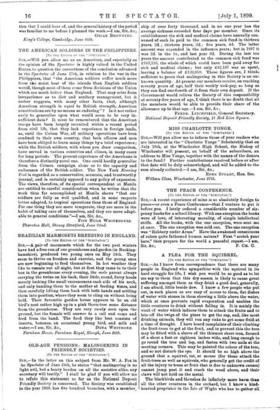THE AMERICAN SOLDIERS IN THE PHILIPPINES.
[To 1IIE ED1101t 01 TELL 'SPECTATOR."]
SIR,—Will you allow me as an American, and especially as the opinion of the Spectator is highly valued in the United States, to question the correctness of the conclusion advanced in the Spectator of June 17th, in relation to the war in the Philippines, that "the American soldiers stiffer much more from the moist beat of the islands than English soldiers would, though most of them come from divisions of the Union which are much hotter than England. That may arise from inexperience as to diet and sanitary management, but it rather suggests, with many other facts, that, although American strength is equal to British strength, American constitutions are by no means so enduring " ? Is it not rather early to generalise upon what would seem to be very in. sufficient data ? It must be remembered that the American troops have been largely recruited within a recent period from civil life, that they lack experience in foreign lands, as, until the Cuban War, all military operations have been confined to their own country, that both officers and men have been obliged to learn many things by a brief experience ; while the British soldiers, with whom you draw comparison, have served in various countries and climes, in many cases for long periods. The present experience of the Americans is therefore a distinctly novel one. One could hardly generalise from the Crimea campaign alone as to the capacity and endurance of the British soldier. The New York Evening Post is regarded as a conservative, accurate, and trustworthy journal, and is certainly opposed to any policy of expansion. The views, therefore, of its special correspondent at Manila are entitled to careful consideration when he writes that the work thus far accomplished at Manila shows "that our soldiers are fully as well qualified, and in some respects better adapted, to tropical operations than those of England. For one thing they are more temperate, they are more in the habit of taking care of themselves, and they are more adapt. able to general conditions."—I am, Sir, &c.,















































 Previous page
Previous page